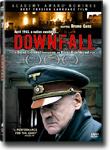 |
|
|||||||||||||||||||||||||||||||||||||||||||||||||||||||||||||
During the last days of World War II, as the Russian Red Army approaches Berlin and Germany's defeat seems imminent, Hitler and the elite of the Third Reich escape to the Reich's Chancellery bunker in subterranean Berlin to make plans and strategize. As reports of the war filter in, it is obvious to Hitler's generals and top officials that the war is lost, yet they are reluctant to show him the real situation. Terrified of Hitler's manic burst of rage, anger and theaterical chest-thumping, these men indulge the Fuehrer to the end in his fantasies of overturning the present situation and ultimately winning the war. Oliver Hirschbiegel's Der Untergang (Downfall) Bruno Ganz is absolutely brilliant in the role of Adolf Hitler. He wavers between softness and tenderness (the scene where he sings with the Goebbels' kids, and his understanding toward Traudl) and maniacal tendencies. We see a childlike demeanor when he sets eyes on a miniature model fo an opera house and his fragility at his last hour, when he stands broken, defeated and shattered. One wonders why director Oliver Hirschbiegel drew so much flak for this humane, balanced treatment of the characters. Nowhere in the film do they arouse any sympathy in us. On the contrary - watching a maniac being capable of kindess and tenderness is a bit unsettling. We see Hitler's complete lack of compassion toward his on people, yet it is strange that the same people are inspired by him. There is this scene where Hitler steps out of the bunker to award medals to young kids for valor. It is Hitler's decision that these teenage boys and girls, or "Hitler youths," fight a losing battle against the Russian army across the bridges in Berlin. But these kids are in awe of him and worship him. Later, we see how Hitler doesn't blink before ordering the flooding of the underground system to halt the unstoppable Russian Army, despite knowing that all hospitals with injured men operate underground. The film then cuts to a character saying "der Fuehrer is der Fuehrer." The serious, somber film has its share of light moments. Himmler's line "When I meet Eisenhower, should I give him the Nazi salute or should I shake his hand?" had me chuckling. Der Untergang The film ends with brief information on what happened to the others in the bunker. Traudl Junge eventually escaped past the Soviet lines. Of the more famous ones, Himmler committed suicide during his imprisonment and trial; Jodl was hanged after the Nuremberg trials. Der Untergang |
|
|||||||||||||||||||||||||||||||||||||||||||||||||||||||||||||
|
||||||||||||||||||||||||||||||||||||||||||||||||||||||||||||||
| action | animation | art house/international | comedy | documentary | drama | family | horror/sci-fi | suspense | television | ||||||||||||||||||||||||||||||||||||||||||||||||||||||||||||||
| contact | home | ||||||||||||||||||||||||||||||||||||||||||||||||||||||||||||||


